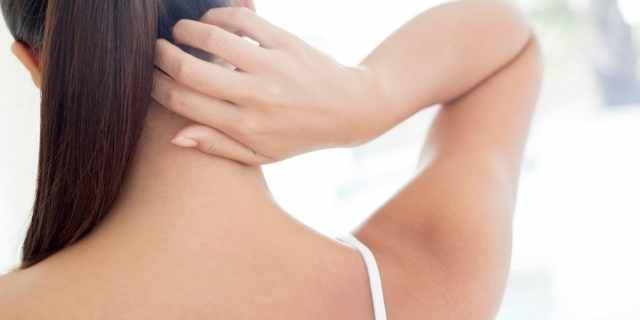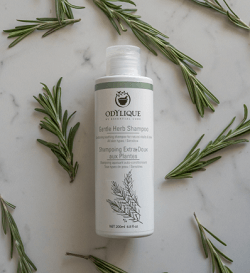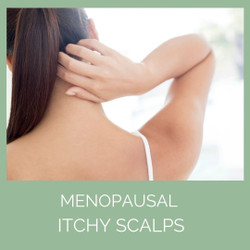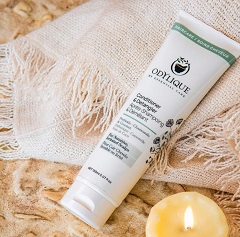If you’re over 40 and suddenly find your scalp is itchy or you're losing more hair than usual, it might be your shampoo, an allergy or it might be down to your hormones, particularly the menopause.

Over the last few years, thanks to the work of brilliant advocates like Dr Louise Newson and Davina McCall, we’ve all a lot more awareness about how broad the effects of Peri menopause (the time prior to full menopause when symptoms develop) and menopause (counted as when periods have stopped for 12 months in a row).
Most of us know about signs like hot flashes, brain fog and irritability, but not so many are aware of some of the lesser-known impacts of this time of life.
As our oestrogen levels plummet, one of the side effects is dry, itchy skin. Our oil glands lose size and reduce production, so our skin, including that on our scalp, wrinkles and becomes more susceptible to damage. Follicle strength is affected which contributes to hair loss.
As we age, our production of collagen, a vital component in the building blocks of healthy skin, slows dramatically which also affects the hair and scalp.
Our skin, especially in blood rich areas like the scalp can become increasingly sensitive, flaky and prone to itching.
This leads to hair fall, and hair thinning, as well as breakage and decreased nutrition to the hair.
So, it’s vital to consider your scalp and hair health as part of your overall menopause health regime.
How to limit the impact of menopause on hair loss and scalp health
First steps – Good Nutrition Matters for Great Hair:
A good hormonal balance is critical. What you put into your body is easily as important as what you put on it.
See a doctor and, if you can, a hormone health professional who can advise you on supplements and check you’re not experiencing additional conditions like hypothyroidism, which can also cause hair and scalp issues.
If you smoke, quit. Nicotine decreases the production of oestrogen significantly, and it won’t help any of your symptoms. It also leeches nutrients from the skin and destroys collagen so will rapidly increase the rate at which you see the signs of menopause-related ageing in your hair and scalp.
In terms of diet, foods rich in collagen (challenging if you’re vegan but doable), Vitamins A and C are all important, as are organically sourced Omega 3s. Supplementing with zinc and selenium is advised by most health professionals to support overall skin health and wellbeing.
Next Up – Consider Your Shampoo
If you’re still using shampoos that contain SleS or SLS (Sodium Laureth and/or Sodium Lauryl Sulphates), now is the time to make a switch to a natural shampoo alternative.
Strong chemical detergents like sulphates are there to cut through grease and are extremely hard on the scalp. If you’re already experiencing challenges, they will exacerbate the issue greatly.
Another ingredient to be aware of is silicone. This is there to add artificial shine but creates a layer of plastic-type coating on the hair, weighing it down and stressing the scalp.
Salt is sometimes added to shampoos to bulk up the foaming agents. Again, this is very harsh on the scalp and hair structure, so try to avoid it.
Finally, artificial fragrance is another primary trigger of scalp irritation or itchiness.
All of these ingredients can combine to stress the scalp and hair follicles, increasing the likelihood of hair loss at a time when you need it least.

Instead, look for a gentle, herb-based shampoo that works with the natural structure of your hair to promote health. (As opposed to mainstream ‘chemical’ shampoos, which create an initial ‘look’ of health, but lead to the overall detriment of the hair in the long term.)
Ingredients including aloe, which is soothing, coconut oil, for natural moisturising and horsetail for gentle but effective cleansing are all good options. Prebiotics and probiotics are also helpful to create good conditions for scalp health that minimise hair loss.
Rosemary Shampoo is often sought out by those seeking a reviving haircare solution.
Your shampoo should also be PH Balanced (around 5.5) to match the PH balance of your scalp. Too acidic and it will cause itching and soreness, too alkaline, dryness and sensitivity.
Finally – Treatments and Care for Menopausal Hair
Now is the time of life to consider nourishing treatments and consider your styling requirements. Try and give your scalp a break from heat treatments (blow drying etc) at least one day a week.
Reduce the temperature of your styling wands and dryers. Frying your hair with 220 degree curlers will not help its already delicate condition. 170 max is more than enough.
Avoid plastic hairbrushes. Natural brushes, or a wide tooth comb, are better for limiting hair loss and breakage.
Finally, use a very lightweight conditioner, no more than once or twice a week to smooth the hair shaft and nourish the hair. Again, ingredients like coconut, and products that are silicone free, non sulphate and quat-free are important to avoid irritating the scalp.
Reviving Rosemary Conditioner offers all the benefits of rosemary keratin-promoting seaweed and rice water, plus prebiotics, all without silicone.
You can also try Ayurvedic herbs, like bhringaraj - applied as a mask for 30 minutes - which is believed to help combat hair loss, particularly when the body is in imbalance.
Other than menopause, there are several other causes of an itchy scalp which we describe here, as well as hair loss.
We've been finding natural solutions for challenged skin for over 30 years. - For more hair or skin advice at every stage of life, get in touch - 01638 491022 or email customercare [at] odylique.co.uk.
Please also enjoy 20% off your first order of any Odylique skin and hair care - with code CARE20 at the checkout.


